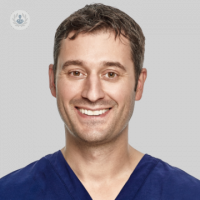Why are dental implants a game changer in dentistry?
Written by:Top Doctors recently had the pleasure of speaking to esteemed and experienced London-based prosthodontics specialist, Professor Christian Mehl. In this article, Professor Mehl walks us through the main advantages of getting dental implants, whilst outlining the success rates and associated risks to the typical dental implant procedure.

What is the main advantage of dental implants?
With dental implants, we can recreate artificial roots, and we can base restorations on these artificial roots. What this all means is that many patients do not need to have their dentures removed, but can rather have fixed, straight teeth again. They are a game changer in dentistry.
Is the dental implant process a difficult one to go through for patients, and what’s involved?
If the patient has plenty of bone left, then yes, the dental implant procedure is very easy, and can take no longer than ten minutes. However, when there is extensive bone missing, in some instances, the bone needs to be recreated first, with the implants then being placed three or four months down the line.
What are the risks associated with having dental implants?
The dental implant procedure is one of the safest. Over a ten-year period, we have seen success rates between 97 and 98 per cent. There is a 50 per cent success rate over a 20-year period relating to dental implants staying in place.
However, there are risks involved. Patients can suffer from bleeding and swelling, and there a two per cent risk of inflammation in the upper jaw. Then, in the lower jaw area, there is a nerve that should never be touched, and if it is accidentally touched during a dental implant procedure, a very small part of the lip can go numb for the rest of the patient’s life.
Does it hurt? Are patients given painkillers?
We normally give patients either 400g or 800g of painkillers before the operation. They are also given 2g of penicillin. Patients are also given a specific mouthwash that significantly reduces the risk of infection.
They also receive local injections and/or sedation, so the dental implant procedure itself is completely painless.
Are dental implants permanent?
Everything in the mouth, unfortunately, is subject to wear and tear because we use it every day. As a result, our natural teeth, as well as dental implants, can fail.
Initially, we see a one per cent failure rate per year, and around that for the first ten years. Between 70 and 80 per cent of the dental implants are still in place after 20 years. Oral hygiene at home is key when it comes to maintaining your dental implants for a long period of time.
Are dental implants worth it, and why?
Yes, it is. We are essentially creating a new tooth, which is a dream come true for many. If the patient is very young (between 15 and 30 years of age), they might be better considering other options.
Then, between the ages of 25/30 until 60/65, dental implants are absolutely fantastic because they give you an option to restore teeth without having to drill down neighbouring teeth. Then, between the ages of 70 and 100, dental implants save them having to undergo surgery.
If you are considering dental implants, make sure to book a consultation with Professor Christian Mehl today. You can do just that by simply heading on over to his Top Doctors profile today.


